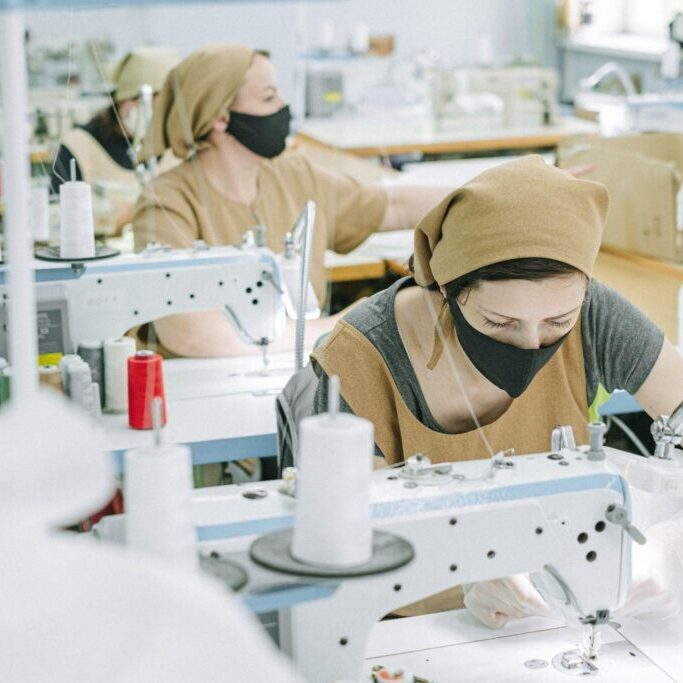
Small steps, big impact!
CMT vs. FPP: Which Factory is Right for Your Intimate Apparel Brand?
Whether you are a start-up or retailer wanting to start producing your own branded intimate apparel, it is often daunting to decide which types of factories is best to choose from: CMT vs. FPP. Depending on your product, budget, and design complexity, one may be better suited for your needs than the other. Here, we will talk about both CMT and FPP factories so you can make an informed decision about which factory is right for your intimate apparel brand.
What is CMT Factory?
CMT refers to Cut, Make, and Trim and these types of factories run production based on the raw materials and designs given by the client. Based on what you provide them, typically, they cut fabrics, assemble the clothing pieces and finish the garment with trimmings like buttons, zippers, and labels.
CMT factories are often called upon to produce clothes for small businesses, including start-ups and boutique brands, as well as large designer labels. It is also possible for CMT factories to subcontract orders from Fully Factored factories.
Pros:
- Usually, they have lower MOQ.
- They often use the latest machinery and technology.
- Brands have full control over design, fabrics, trims, labels and packaging.
- High level of quality control and greater transparency.
Cons:
- Smaller operations.
- Usually, higher unit price per garment.
- Relatively less experienced/skilled.
- They need a strong tech pack always supplied by the brand.
- Not be able to do high volume production.
- Client has to source every single component (fabrics, trims, labels, packaging) and send it to the factory.
- Logistics have to be arranged and paid by client.
- Due to logistic costs added, unit price usually goes up.
What is an FPP Factory?
FPP refers to Full Product Package, also known as fully factored manufacturer. This type of factories offer all-in-one solutions for creating intimate apparel. From design to sourcing, and production to packaging and shipping to client final destination, the FPP factories certainly offer full services from start to finish. They are ideal for brands who don’t have much time to manage the entire process.
Pros:
- Easier and convenient for brands as the design, sourcing and production, everything is done by one party.
- FPP factories have greater accountability for any unwanted manufacturing errors.
- Relatively much cheaper in terms of cost effectiveness and time.
- More reliable in terms of quality and lead-times than CMT factories.
Cons:
- Higher MOQ.
- Require higher investment.
- Less control, less flexibility and less transparency over the manufacturing.
Which Factory is Right for You?
A big con of CMT is that the entrepreneur needs to send all fabrics, trims, and other necessary materials to the manufacturer. This can be a daunting and expensive task. If the fabrics or elastics need to be dyed, they should have already been dyed before being sent to the manufacturer to produce samples and bulk orders. This requirement can pose a significant issue for companies. Especially if they are working on a tight budget or a short timeline. In contrast, finding a Full Package factory can be a much more attractive option as it eliminates the need to send materials to different locations for different processes. The Full Package factory can handle all aspects of the production process, including sourcing materials, dyeing, and finishing. This not only saves time and money but also ensures better control over the production process, resulting in higher quality products.
Simply with CMT, you will have to provide very clear specifications and patterns in order to ensure accuracy, while with FPP, you will require less expertise but more capital. The right intimate apparel factory for you depends on your specific needs and goals. Basically factors like costs, level of knowledge and experience, production size, potential manufacturers, factory location, and degree of control are key to choosing from CMT vs FPP.
Inexperienced newcomers or start-ups need experts’ help to manage all the things. It is natural that most of the retailers have not enough knowledge with the designs and manufacturing of their garments. However, if you have vision to establish your own brand, you need to look at the manufacturing too and there are few experts out there to help you. Wish to know more with the intimate apparel industry, following are few topics that you might feel interested:
- Intimate Apparel: Why You Need to Understand MOQ?
- Private Label vs. White Label vs. OEM: Which is Right for Your Intimate Apparel Brand?
- Designing Intimate Apparel: The Impact of Different Body Shapes & Sizes
- From Lingerie to Activewear: Understanding Women’s Intimate Apparel
- How to Differentiate Your Lingerie Line from the Competition?
If you wish to know even more and want to share your thoughts with us, Let’s talk to discuss further details.
